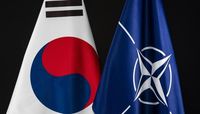In a significant expansion of its international partnerships, NATO welcomed the Republic of Korea, Switzerland, and Ukraine into its Science & Technology Organization (STO) Enhanced Partnership on March 22, 2025. This strategic move aims to bolster NATO's scientific and technological collaboration with these non-member nations, adding to the program's existing participants, Australia and Japan.
NATO's Enhanced Partnership has been pivotal since its inception, facilitating shared development and scientific expertise. By joining this program, the new partners will actively engage in the NATO Science & Technology Board, which is responsible for charting the strategic direction of joint research and innovation. This development is viewed as a crucial step towards enhancing technological cooperation and interoperability among member and partner nations.
NATO Chief Scientist Dr. Bryan Wells expressed enthusiasm about the inclusion of Korea, Switzerland, and Ukraine in this initiative. He described it as a "step change" in NATO's scientific engagement, reflecting the organization’s long-standing commitment to collaboration with its global partners. Dr. Wells emphasized the importance of these new partnerships, stating that they would play a vital role in promoting security through advancements in science and technology.
Australia and Japan were the first nations to participate in the Enhanced Partnership, joining in 2015 and 2020, respectively. With the addition of the three new countries, NATO aims to further expand its network of innovative partners, thereby advancing its technological capabilities. The integration of these nations is expected to lead to collaborative efforts on various fronts, particularly in defense technology and research.
The upcoming NATO Science & Technology Board meeting, set to take place in Brussels in April 2025, will be the first opportunity for the new partners to officially engage with existing members. This meeting is expected to serve as a platform for discussing potential projects that utilize their collective expertise, fostering collaboration on capabilities that are increasingly essential in today’s security landscape.
The inclusion of Korea, Switzerland, and Ukraine into the Enhanced Partnership represents not only an expansion of NATO’s scientific community but also a broader geopolitical strategy aimed at enhancing alliances amidst growing global tensions. As nations face unprecedented challenges, the importance of scientific collaboration becomes increasingly apparent, particularly in areas that require cutting-edge technological solutions.
The South Korean participation reflects its ongoing commitment to strengthening international security and innovation, while Switzerland's neutrality positions it uniquely to contribute to consensus-driven research and development efforts. Ukraine, amidst the ongoing conflict resulting from its war with Russia, seeks to leverage its participation for gaining technological support and expertise that may bolster its defense capabilities against external threats.
Countries participating in the Enhanced Partnership will likely engage in various joint initiatives, focusing on areas like artificial intelligence, cybersecurity, and advanced propulsion systems. Such projects aim to ensure that NATO remains at the forefront of technological advancement, addressing threats that are continually evolving in an increasingly complex global security environment.
This new alignment with Korea, Switzerland, and Ukraine not only enhances NATO's scientific dimension but also aligns with its strategic objective of integrating diverse perspectives from around the world. Through this initiative, NATO underscores its commitment to fostering international collaboration that transcends geographical boundaries, leading to more cohesive efforts in addressing common security challenges.
The implications of this expanded partnership will be closely monitored by international analysts, who will be assessing how it could reshape military and technological cooperation among NATO member and partner countries. Observers Acknowledge the potential for innovations that may arise from such collaborations, particularly in the context of shared research initiatives that can expedite the development of novel defense technologies.
As NATO approaches its next Science & Technology Board meeting, all eyes will be on how these new partnerships are formalized within the framework of existing collaborative structures. The anticipation surrounding potential announcements regarding joint research projects and shared technological endeavors marks a pivotal moment for NATO as it adapts to the demands of a new geopolitical landscape.
In summary, the accession of Korea, Switzerland, and Ukraine into the NATO Enhanced Partnership signifies not just an expansion of membership but also a commitment to leverage science and technology as crucial tools for 21st-century security challenges. As NATO continues to integrate non-member nations into its scientific framework, the organization remains poised to capitalize on diverse innovations that can enhance its defense posture globally.






